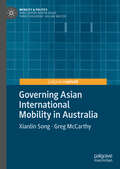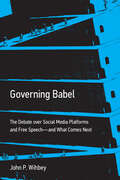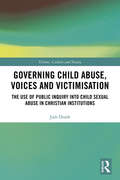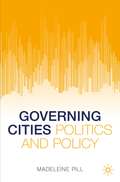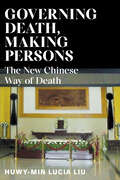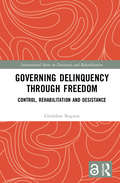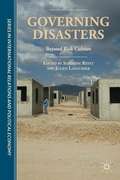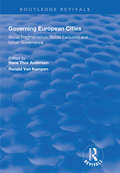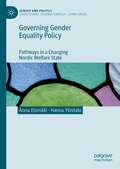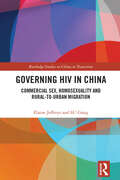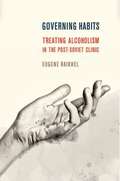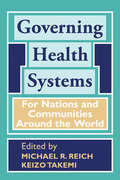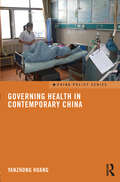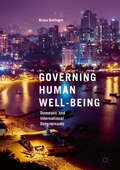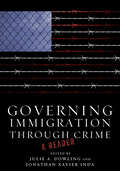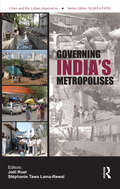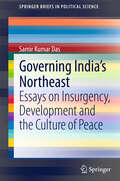- Table View
- List View
Governing Asian International Mobility in Australia (Mobility & Politics)
by Xianlin Song Greg McCarthyThis book examines the governance of Asian student and academic mobility, which has transformed the higher education landscape. While campuses are experiencing an unprecedented level of diversity, knowledge creation remains explicitly Eurocentric and dominated by the Global North. The authors advocate for a new educational paradigm that takes into account the transcultural flow of knowledge on campus as a public good, capitalises on Asian students and academics’ multilingual competencies, and offers them equal access to creating quality-orientated education. The book argues that international higher education must be grounded in both a plurality of knowledges and the ethics of cognitive justice, and that the governing policies should facilitate the higher education sector to build a platform of internationalising affect and effect on campus.
Governing Babel: The Debate over Social Media Platforms and Free Speech--and What Comes Next
by John P. WihbeyWhy social media platforms have a responsibility to look after their platforms, how they can achieve the transparency needed, and what they should do when harms arise.The large, corporate global platforms networking the world&’s publics now host most of the world&’s information and communication. Much has been written about social media platforms, and many have argued for platform accountability, responsibility, and transparency. But relatively few works have tried to place platform dynamics and challenges in the context of history, especially with an eye toward sensibly regulating these communications technologies.In Governing Babel, John Wihbey articulates a point of view in the ongoing, high-stakes debate over social media platforms and free speech about how these companies ought to manage their tremendous power.Wihbey takes readers on a journey into the high-pressure and controversial world of social media content moderation, looking at issues through relevant cultural, legal, historical, and global lenses. The book addresses a vast challenge—how to create new rules to deal with the ills of our communications and media systems—but the central argument it develops is relatively simple. The idea is that those who create and manage systems for communications hosting user-generated content have both a responsibility to look after their platforms and have a duty to respond to problems. They must, in effect, adopt a central response principle that allows their platforms to take reasonable action when potential harms present themselves. And finally, they should be judged, and subject to sanction, according to the good faith and persistence of their efforts.
Governing Child Abuse Voices and Victimisation: The Use of Public Inquiry into Child Sexual Abuse in Christian Institutions (Victims, Culture and Society)
by Jodi DeathChild sexual abuse by clergy within the Roman Catholic Church has emerged as a social and political discourse over the last three decades. The analysis here specifically focuses on the establishment, conduct, and outcomes of the extensive public inquiries of Australia, although inquiries in other jurisdictions are also discussed. Unlike criminal or civil processes, although they may be inquisitory in nature, public inquiries emerge from a specifically political context and are a tool of governance embedded in a larger context of governmentality. Understanding the broader political and cultural contexts of public inquiries is important, then, in understanding their value and effectiveness as justice processes – especially for victims of CSA by clergy. What is interesting about public inquiry is that it situates victims of CSA by clergy outside of criminal and civil justice processes and recognises a different politicised relationship between victims as citizens, the state, and Catholic institutions where abuse has occurred. At the cutting edge of disciplinary and methodological understandings of the interconnections between the church, state and families, his book explores the dynamics of the emergence and politicisation of victims of CSA by clergy, their expressions of resistance and the legitimisation of their voice in public and political spheres.
Governing Child Sexual Abuse: Negotiating the Boundaries of Public and Private, Law and Science
by Samantha AshendenThe turn of the 1990s saw a number of high profile public inquiries into the handling of child sexual abuse cases in Great Britain. In examines the implications of these inquiries on the regulation of relationships between families and the state, author Samantha Ashenden brings a number of contemporary debates in social and political theory to bear upon the governance of child sexual abuse. In particular, drawing on the work of Foucault and Habermas, Ashenden looks at:* how to analyze the boundary between public and private spheres* the legal and scientific determination of legitimate intervention* the relationship between democracy and expertise in the governance of social life.Timely and topical, this book will be of particular interest to scholars and students of social and political theory, political sociology, the sociology of law, and social policy.
Governing Cities: Politics and Policy
by Madeleine PillIn our urban world, cities are where most of us experience how our economies and societies are organised and the inequalities which result. This textbook introduces ideas, theories, concepts and examples to help us understand the political and policy challenges of governing cities, centred on the principal challenge of how to make our cities more equitable. It poses critical questions – about how cities are governed, by whom, according to what values, and for whom – and draws from a wide range of urban scholarship. The ‘how’ covers urban politics and the policy instruments which result. The ‘by whom’ addresses power relations within and beyond the city and the tensions between different priorities and values. The ‘for whom’ centres equity and the role of citizens and collective action in how we are governed. In addressing these questions, the book provides an overview of the core theories of urban politics and governance, thinks about what happens at different scales, and examines new forms of citizen activism which herald alternatives for cities. It is a unique introduction to students, policymakers and practitioners who want to understand and seek to improve urban politics and policy.
Governing Climate Induced Migration and Displacement: Igo Expansion And Global Policy Implications (International Political Economy Series)
by Andrea SimonelliAndrea Simonelli provides the first in-depth evaluation of climate displacement in the field of political science, specifically global governance. She evaluates four intergovernmental organizations (UNHCR, IOM, OCHA and the UNFCCC), and the structural and political constraints regarding their potential expansion to govern this new issue area.
Governing Cotton
by Adam SneydThis book traces the historic relationships between cotton production, the international cotton trade and poverty south of the Sahara, and assesses various approaches to corporate social responsibility and nongovernmental policy advocacy in this area.
Governing Death, Making Persons: The New Chinese Way of Death
by Huwy-min Lucia LiuGoverning Death, Making Persons tells the story of how economic reforms and changes in the management of death in China have affected the governance of persons. The Chinese Communist Party has sought to channel the funeral industry and death rituals into vehicles for reshaping people into "modern" citizens and subjects. Since the Reform and Opening period and the marketization of state funeral parlors, the Party has promoted personalized funerals in the hope of promoting a market-oriented and individualistic ethos. However, things have not gone as planned.Huwy-min Lucia Liu writes about the funerals she witnessed and the life stories of two kinds of funeral workers: state workers who are quasi-government officials and semilegal private funeral brokers. She shows that end-of-life commemoration in urban China today is characterized by the resilience of social conventions and not a shift toward market economy individualization. Rather than seeing a rise of individualism and the decline of a socialist self, Liu sees the durability of socialist, religious, communal, and relational ideas of self, woven together through creative ritual framings in spite of their contradictions.
Governing Delinquency Through Freedom: Control, Rehabilitation and Desistance (International Series on Desistance and Rehabilitation)
by Géraldine BugnonThis book analyses the non-custodial government of young offenders in two major cities in Brazil. In doing so, it delves into the paradox of an institution exerting control over youths while at the same time promoting their autonomy and responsibility. The study sheds light on the specific logics of power, control, and inequality produced by such institutional settings. The book’s analysis is based on an ethnographic study of ‘Assisted Freedom’ (Liberdade Assistida) – a form of probation – in the Brazilian cities of Rio de Janeiro and Belo Horizonte. This particular context – which is characterized by endemic violent crime, on the one hand, and a highly protective juvenile justice system, on the other – sheds productive light on the contradictions of juvenile justice systems and other public policies based on the values of citizenship, autonomy, and responsibilization. The analysis takes the form of an inverted zoom structure: it begins by looking at cognitive and interactional processes at the level of interpersonal relationships between youths and professionals, and then works its way up to examine ties outside the institution itself, with schools, the labour market, and juvenile courts. Written in a clear and direct style, this book will appeal to students and scholars in criminology, sociology, cultural studies, and social theory and those interested in learning about non-custodial measures and the regulation of juvenile delinquency.
Governing Disasters
by Ali Shahla F.With growing awareness of the devastation caused by major natural disasters, alongside integration of governance and technology networks, the parameters of humanitarian aid are becoming more global. At the same time, humanitarian instruments are increasingly recognizing the centrality of local participation. Drawing on six case studies and a survey of 69 members of the relief sector, this book suggests that the key to the efficacy of post-disaster recovery is the primacy given to local actors in the management, direction and design of relief programs. Where local partnership and knowledge generation and application is ongoing, cohesive, meaningful and inclusive, disaster relief efforts are more targeted, cost-effective, efficient and timely. Governing Disasters: Engaging Local Populations in Humanitarian Relief examines the interplay between law, governance and collaborative decision making with international, state, private sector and community actors in order to understand the dynamics of a global decentralized yet coordinated process of post-disaster humanitarian assistance.
Governing Disasters
by Sandrine Revet Julien LangumierIrreversible and exceptional events, disasters are nevertheless governed, usually in the context of specific, dedicated interventions by state authorities or NGOs, who aim to lead the affected population from a place of emergency to a new, post-disaster - but still undefined - position. How do the victims of disaster interact with the dispositifs of government and disaster? Based on extensive research - both ethnographic and historical - conducted over a long period of time in field locations as various as Hong-Kong, Kazakhstan, Sri Lanka, France, Argentina, and Italy, this volume offers an acute analysis of how actors at local, national, and international levels govern disasters. Chapter contributions show that the victims of disaster do not remain passive; rather, they react to and critique what this volume calls the 'government of disaster' and one of its central paradigms, the culture of risk, which leaves unaddressed key political issues.
Governing Enterprises in China: Corporate Boards, Ownership and Markets (Dynamics of Asian Development)
by Rajah Rasiah Kee Cheok Cheong Zhang ChengThis book examines the nature of the marketization of corporate boards following the introduction of the split share reform, corporate board and shareholder relations, corporate performance, and risk-taking conduct in China. The chapters cover topics such as determinants of corporate board size and independence, corporate risk-taking conduct under different controlling shareholder types. The book deepens our understanding of corporate governance mechanisms as most previous studies have limited their findings using mainstream perspectives grounded on neoclassical theory. It outlines that China’s corporate board composition is determined by the board’s scope of operation, monitoring, bargaining power, and other governance mechanisms and regulations. It also offers a comparison between China’s experience with other economies in general and other transition economies in particular. As such, the book represents an essential overview of the current concerns regarding corporate governance in China. It is of great interest to legal researchers, policymakers, and legal practitioners working with business investments in China.
Governing Environmental Conflicts in China (China Policy Series)
by Yanwei LiEnvironmental conflicts are the source of many large-scale popular protests in China, with some protests substantially endangering social order. Such protests have often prompted severe counter measures by both national and local government, but have often then gone on to result in compromises whereby the demands of protesters have been largely met. This book considers the nature of environmental conflicts in China and the way in which national and local governments have handled the situations. It includes detailed case studies of particular conflicts, relates the governance of environmental conflicts in China to wider discussions on the nature of governance and examines under what conditions government in China makes compromises. The book concludes by assessing the lessons for the future.
Governing European Cities: Social Fragmentation, Social Exclusion and Urban (Routledge Revivals)
by Hans Thor AndersenThis title was first published in 2001. This volume is a result of the action COST A9 "Civitas - Transformation of European Cities and Urban Governance", launched in 1995, which looks at the emergence of the urban question. The COST framework is a European mechanism to provide scientific and technical assistance for national research programmes. The text covers the change in the importance of European cities and analyzes how each city re-formulates its policies and methods of governing in response to these changes. This text is to analyze the new forms of urban governance using three points of view, a statistical approach, an economic approach and a sociological approach. This book tackles the fragmentation and social exclusion that occurs in urban society and explores the different forms it takes throughout Europe. It also presents some strategies to combat or at least regulate this fragmentation, to ensure a united European city.
Governing Gender Equality Policy: Pathways in a Changing Nordic Welfare State (Gender and Politics)
by Anna Elomäki Hanna YlöstaloThis book analyses the effects of public governance reforms on gender equality policy in Finland. Recent economic crises, rising austerity and increasing opposition to gender equality have led to the defunding of gender equality bodies, and the side-lining of gender equality as a political goal. This policy backlash has taken place alongside transformations to the state and governance, that have changed the discourses, knowledge, actors, and practices of gender equality policy. This book contributes to these discussions by demonstrating the subtleties of the constantly changing governance reform agendas, their operation in practice, and how they intertwine with other elements of the gender equality policy backlash. It is based on more than 100 interviews with civil servants, politicians, non-governmental organisations, social partners, and think tanks, and a broad range of policy documents and media material. It will appeal to students and scholars of gender studies, public policy and governance.
Governing Groundwater: Between Law and Practice (Water Governance - Concepts, Methods, and Practice)
by Gabriela Cuadrado-QuesadaThis book empirically examines a diverse range of groundwater issues and different approaches to deal with such concerns taking into account responses from government bodies, community organizations, scientists, private sector, and academia. The overarching objective of this book is to empirically examine groundwater governance and groundwater law. It aims to provide a better understanding of the complexities surrounding groundwater governance in order to reconceptualize and retheorize the governance of subterranean resources having as entry points equity and sustainability concerns. This involves understanding what people do when using, sharing, protecting, and measuring groundwater; and why do they do what they do, i.e., what are their motivations to resort to certain practices. This is done through the comparative and contrasting investigation of six case studies from countries from the Global North and Global South. It offers a different perspective of literature given that it explains how groundwater governance and law are in practice rather than what they should be. Additionally, the research presented in this book provides ideas on how to rethink the design and implementation of groundwater law grounded on empirically based descriptions and the understanding of groundwater problems.
Governing HIV in China: Commercial Sex, Homosexuality and Rural-to-Urban Migration (Routledge Studies on China in Transition)
by Gang Su Elaine JeffreysHIV and AIDS have long been problematized in the People’s Republic of China as objects of governance in political frameworks and institutions. The state’s attitudes towards health programs have, nevertheless, changed significantly during the 21st century. Pilot programs at the beginning of the century, which focused on underground sex workers, have now developed into the roll-out of a nationwide program, with supportive legislation and broadcast media publicity. This book therefore examines China’s evolving AIDS response, providing an up to date investigation into the positions and practices of the state. It explains the origins, rationales and implementation of initiatives focused on female sex workers and explores the extension of such initiatives to include other populations identified as key to ending the AIDS epidemic, especially homosexual men and rural-to-urban migrant labourers. Ultimately, through an analysis of the different approaches to the governance of commercial sex and sexual health, Governing HIV in China concludes by considering the challenges raised by China’s commitment to the United Nations’ vision of ending AIDS as a global health threat by 2030. This book will be useful for students and scholars of Social Policy, Public Health Policy and Chinese Studies.
Governing Habits: Treating Alcoholism in the Post-Soviet Clinic
by Eugene RaikhelCritics of narcology—as addiction medicine is called in Russia—decry it as being "backward," hopelessly behind contemporary global medical practices in relation to addiction and substance abuse, and assume that its practitioners lack both professionalism and expertise. On the basis of his research in a range of clinical institutions managing substance abuse in St. Petersburg, Eugene Raikhel increasingly came to understand that these assumptions and critiques obscured more than they revealed. Governing Habits is an ethnography of extraordinary sensitivity and awareness that shows how therapeutic practice and expertise is expressed in the highly specific, yet rapidly transforming milieu of hospitals, clinics, and rehabilitation centers in post-Soviet Russia. Rather than interpreting narcology as a Soviet survival or a local clinical world on the wane in the face of globalizing evidence-based medicine, Raikhel examines the transformation of the medical management of alcoholism in Russia over the past twenty years.Raikhel's book is more than a story about the treatment of alcoholism. It is also a gripping analysis of the many cultural, institutional, political, and social transformations taking place in the post-Soviet world, particularly in Putin's Russia. Governing Habits will appeal to a wide range of readers, from medical anthropologists, clinicians, to scholars of post-Soviet Russia, to students of institutions and organizational change, to those interested in therapies and treatments of substance abuse, addiction, and alcoholism.
Governing Health Systems: For Nations and Communities Around the World
by Michael Reich Keizo TakemiGoverning Health Systems: For Nations and Communities Around the World examines the complex relationships between governance and performance in community and national health systems. Each chapter provides an in-depth case study, using both qualitative and quantitative methods, on health systems in many countries, including Uganda, Ghana, India, Zambia, Japan, Nigeria, Indonesia, Brazil, Palestine, and South Korea. The chapters were written by former Takemi Fellows, who were mid-career research fellows at the Harvard School of Public Health, and their colleagues. This case study approach yields important findings as well as contextual insights about the challenges and accomplishments in addressing governance issues in national and community health systems around the world. Health policymakers around the world are struggling to address the multiple challenges of governing health systems. These challenges also represent important themes for the research mission of the Takemi Program in International Health at the Harvard School of Public Health. This book is based on the program's thirtieth anniversary symposium held in October 2013 at Harvard. The studies presented in this book--deep examinations of illustrative examples of health system governance for communities and nations--contribute to our knowledge about global health and assist policymakers in dealing with the complex practical problems of health systems. In short, this book addresses central questions about governing health systems--and why governance matters.
Governing Health in Contemporary China (China Policy Series)
by Yanzhong HuangThe lack of significant improvement in people’s health status and other mounting health challenges in China raise a puzzling question about the country’s internal transition: why did the reform-induced dynamics produce an economic miracle, but fail to reproduce the success Mao had achieved in the health sector? This book examines the political and policy dynamics of health governance in post-Mao China. It explores the political-institutional roots of the public health and health care challenges and the evolution of the leaders’ policy response in contemporary China. It argues that reform-induced institutional dynamics, when interacting with Maoist health policy structure in an authoritarian setting, have not only contributed to the rising health challenges in contemporary China, but also shaped the patterns and outcomes of China’s health system transition. The study of China’s health governance will further our understanding of the evolving political system in China and the complexities of China’s rise. As the world economy and international security are increasingly vulnerable to major disease outbreaks in China, it also sheds critical light on China’s role in global health governance.
Governing Human Well-Being
by Nisha BellingerThis book provides a comprehensive explanation of human well-being outcomes by analyzing the role of domestic and international political factors. The well-being outcomes under study are the building blocks of development, and play a crucial developmental role in the lives of citizens, states, and the global community. The project introduces cases from Brazil, Japan, China, and Iraq, and proposes to answer some of the pressing questions that scholars and policy-makers alike have pondered over for years. Why are there large disparities between countries in the quality of life people lead? What factors account for the general well-being of mankind? How do we improve human lives?
Governing Immigration Through Crime: A Reader
by Julie A. Dowling Jonathan Xavier IndaIn the United States, immigration is generally seen as a law and order issue. Amidst increasing anti-immigrant sentiment, unauthorized migrants have been cast as lawbreakers. Governing Immigration Through Crime offers a comprehensive and accessible introduction to the use of crime and punishment to manage undocumented immigrants. Presenting key readings and cutting-edge scholarship, this volume examines a range of contemporary criminalizing practices: restrictive immigration laws, enhanced border policing, workplace audits, detention and deportation, and increased policing of immigration at the state and local level. Of equal importance, the readings highlight how migrants have managed to actively resist these punitive practices. In bringing together critical theorists of immigration to understand how the current political landscape propagates the view of the "illegal alien" as a threat to social order, this text encourages students and general readers alike to think seriously about the place of undocumented immigrants in American society.
Governing India's Metropolises: Case Studies of Four Cities (Cities and the Urban Imperative)
by Stéphanie Tawa Lama-Rewal Joël RuetThis book is a comparative, sector-based study of the changing character of governance in Indian metropolises in the 2000s. Highlighting the horizontal and vertical ties of the participatory groups, both state and non-state, it looks at key civic issues.
Governing India's Northeast
by Samir Kumar DasThis book focuses on issues of governance and the nature and complexities of social transformation in India's Northeast -- a 'problem' zone for policymakers -- particularly since the early 1990s. While governance is the thread that runs through the volume, the latter at one level addresses the challenges of governing in global times a region historically marked by acute violence, interethnic conflict and insurgency; and at another, traces macro changes in the very forms and technologies of governance. The essays in this volume point to how changing forms and technologies of governing insurgency, development and culture do not remain mere instruments of peace, but define the very nature and content of both peace and conflict and their interrelationship in the region.For the first time in the history of scholarship on the region, the three crucial issues of insurgency, development and culture have been analysed through the lens of governance. This volume, therefore, marks an important addition to the scholarship on the region.
Governing Indigenous Territories: Enacting Sovereignty in the Ecuadorian Amazon
by Erazo Juliet S.Governing Indigenous Territories illuminates a paradox of modern indigenous lives. In recent decades, native peoples from Alaska to Cameroon have sought and gained legal title to significant areas of land, not as individuals or families but as large, collective organizations. Obtaining these collective titles represents an enormous accomplishment; it also creates dramatic changes. Once an indigenous territory is legally established, other governments and organizations expect it to act as a unified political entity, making decisions on behalf of its population and managing those living within its borders. A territorial government must mediate between outsiders and a not-always-united population within a context of constantly shifting global development priorities. The people of Rukullakta, a large indigenous territory in Ecuador, have struggled to enact sovereignty since the late 1960s. Drawing broadly applicable lessons from their experiences of self-rule, Juliet S. Erazo shows how collective titling produces new expectations, obligations, and subjectivities within indigenous territories.
